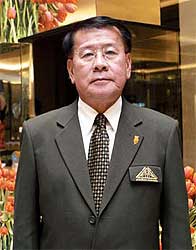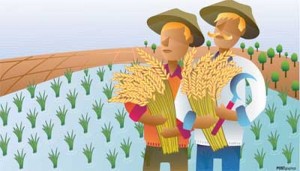By: Phusadee Arunmas and Nareerat Wiriyapong
Samian Hongto, a 60-year old rice farmer, feels intimidated whenever he hears talk about foreigners being interested in getting into agriculture in Thailand.
The owner of 30 rai in Song Phi Nong, Suphan Buri, one of the country's largest rice production areas, worries that his children and grandchildren could end up being just the workers in fields owned by cash-rich foreigners, should they really be allowed to enter the farm and livestock business.
Mr Samian's fear has grounds, as he and his neighbours have from time time been approached by Thai brokers seeking to buy or rent plots to produce rice for foreigners.
"We're afraid Thais would become just the workers on our own land someday," says Mr Samian. "As workers, we probably get paid handsomely in the beginning, but later on, we're afraid of being exploited by those well-heeled employers."

Mounting insecurity over the world's food supply, especially of staples such as wheat, maize, barley and rice, has sent many food importing nations and food-based companies in search of farmland abroad to plant their own food crops.
Large tracts of farmland in Russia and in poor developing countries in South America, Africa, as well as places such as Cambodia and Vietnam, have either been purchased or leased to cultivate crops and the produce shipped to the investors' country of origin.
Gulf Arab countries, in particular, are chasing investments in farmland and agricultural businesses in developing countries to secure food supplies after inflation last year highlighted their dependence on food imports.
Sudan, traditionally known as the breadbasket of the Arab world, has seen a fifth of its cultivated land set aside for Arab governments.
The United Arab Emirates and Egypt have secured 400,000 hectares each in Sudan to plant wheat, while South Korea has secured 690,000 hectares, also for wheat. Saudi Arabia is said to be investing about US$100 million in Ethiopia on leased land to grow wheat, barley and rice.
The UAE, meanwhile, has invested in farmland in Kazakhstan with intention to purchase more land in Africa, Vietnam, Cambodia and South America for food crops.
Even China is looking at Congo for acreage to grow oil palm for food and biofuel consumption for its huge population.
According to the US-based International Food Policy Research Institute (IFPRI), about 15 million to 20 million hectares of farmland in poor countries have been subjected to transactions or talks involving foreigners since 2006.
Apart from governments, foreign companies such as Sweden-based Alpcot Agro bought 120,000 hectares in Russia; South Korea's Hyundai paid US$6.5 million for a majority stake in Khorol Zerno which owns 10,000 hectares in Eastern Siberia; and Morgan Stanley bought 40,000 hectares in Ukraine.
Closer to home, the Bahrain-based Islamic bank Al Salam recently signed an agreement with the Thai agribusiness conglomerate Charoen Pokphand (CP) to jointly invest in agricultural businesses.

Ananta Dalodom, an adviser to the Senate committee on agriculture and co-operatives, attributed mounting interests by Middle Eastern venture capitalists in Thailand to the kingdom's preparedness in all aspects, be it farming technology and expertise, irrigation systems and other infrastructure.
"Agriculture, particularly rice cultivation to produce good crops and output is not that easy, it needs high expertise, and Thailand is the producing nation that is the most ready in skilled labour, crop development, milling and processing as well as irrigation systems," he said.
"If you want to invest in rice production in Thailand, you just walk in with money. That's enough. But the problem we're gravely concerned about is how Thailand would manage in the future if foreigners who were allowed to invest in growing their own crops control the whole market from production process to end-consumers."
According to Mr Ananta, Thailand is more appealing among Arab investors than neighbouring countries such as Cambodia and Laos which are also pursuing campaigns to attract foreign investments in agriculture, particularly through long-term land leasing concessions.
According to Thailand's Foreign Business Act (1999), foreigners or foreign companies are not allowed to rent or buy land to grow rice or any kind of food, including raising any livestock in Thailand.
However, the law allows foreigners to run farm businesses in the form of a joint-venture company in which Thais must own at least 51%.
The Land Act also bars foreigners or foreign companies to have land ownership rights in Thailand.
According to Mr Ananta, foreigners generally need a vast plot as large as 10,000 rai, which is not easy to acquire, as such plots are mostly owned by rich local landlords.
About 1,000 Thai families currently hold holding 400,000 to 500,000 rai each and are unlikely to dispose of their assets as prices will continue to appreciate in the future.
China once tried to lease 100,000 rai of degraded forest land to plant eucalyptus in 1987 but failed inn the face of public opposition in a country where more than one million Thai families remain short of arable land.
Dusit Nontanakorn, the chairman of the Thai Chamber of Commerce, agreed that given Thailand's expertise, the country sees no need for foreign investments in agricultural business and rice production.
"In fact, there is no need for foreigners to invest in producing their own crops here," said Mr Dusit. "They just order the types of rice they need, we are ready to supply and deliver them immediately."
According to Mr Dusit, foreigners are also eligible to buy Thai rice through contract farming deals if they want to control crop quality.
"You simply cannot compare with what Thai investors now invest in Cambodia and Laos, as we provide our local partners technology transfers and the two countries need our assistance. We haven't exploit them but help them to raise their productivity and income," he said.
Nandor von der Lueche, chairman of the Joint Foreign Chambers of Commerce (JFCCT), said he believed the farming or agricultural sector was not the main interest of foreign investors and said the JFCCT was not pushing to liberalise this sector.
"With the agricultural sector, the main problem is that the benefits of the farming activities are not going to farmers but rather to traders," he said.
"If foreign investors are interested in farming, it should be in technology transfer where the farming sector would get the benefit. With the technology transfer from foreign investors, Thai farmers would improve their skills and productivity."
According to Mr von der Lueche, the JFCCT believes that opening up the property sector such as extending land leases for second homes and increasing foreign quotas in condominiums would benefit the Thai economy much more than opening up the farm sector.
"We should separate the land lease and farming business because the farming business is prohibited for foreign participation and reserved for Thais," he said. "The foreign investors can lease the land but cannot conduct farming and business without Thai majority partners.
"If any foreign investors follow the Thai law, they can, of course, get the benefit by exporting the agricultural products to their countries and control the quality of the products that they want by upgrading production technology."
See related article: Existing laws seen adequate to prevent foreign exploitation












